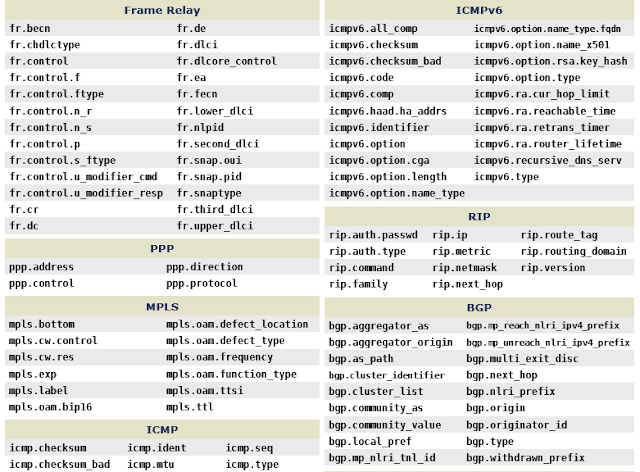Wireshark Cheat Sheet
Wireshark is a network or protocol analyzer (also known as a network sniffer) available for free at the Wireshark website. It is used to analyze the structure of different network protocols and has the ability to demonstrate encapsulation. The analyzer operates on Unix, Linux and Microsoft Windows operating systems, and employs the GTK+ widget toolkit and pcap for packet capturing. Wireshark and other terminal-based free software versions like Tshark are released under the GNU General Public License.
Wireshark Capturing Modes:
Promiscuous mode: Sets interface to capture all packets on a network segment to which it is associated to
Monitor mode:setup the Wireless interface to capture all traffic it can receive (Unix/Linux only)
Filter Types
Capture filter: Filter packets during capture
Display Filter: Hide Packets from a capture display
Protocols - Values: ether, fddi, ip, arp, rarp, decnet, lat, sca, moprc, mopdl, tcp and udp
Filtering packets (Display Filters)
| Filtering packets (Display Filters) | |||||||||||||||||||||||||||||
|
Logical Operators |
||
| and or && | Logical AND | All the conditions should match |
| or or || | Logical OR | Either all or one of the condition should match |
| xor or ^^ | Logical XOR | exclusive alternation – Only one of the two conditions should match not both |
| not or ! | NOT(Negation) | Not equal to |
| [n] […] | Substring operator | Filter a specific word or text |
Common Filtering commands |
|
| Usage | Filter syntax |
| Wireshark Filter by IP | ip.addr == 10.10.50.1 |
| Filter by Destination IP | ip.dest == 10.10.50.1 |
| Filter by Source IP | ip.src == 10.10.50.1 |
| Filter by IP range | ip.addr >= 10.10.50.1 and ip.addr <= 10.10.50.100 |
| Filter by Multiple Ips | ip.addr == 10.10.50.1 and ip.addr == 10.10.50.100 |
| Filter out IP address | !(ip.addr == 10.10.50.1) |
| Filter subnet | ip.addr == 10.10.50.1/24 |
| Filter by port | tcp.port == 25 |
| Filter by destination port | tcp.dstport == 23 |
| Filter by ip address and port | ip.addr == 10.10.50.1 and Tcp.port == 25 |
| Filter by URL | http.host == “host name” |
| Filter by time stamp | frame.time >= “July 22, 2019 18:04:00” |
| Filter SYN flag | tcp.flags.syn == 1 |
| Host name filter | ip.host = hostname |
| MAC address filter | eth.addr == 00:70:f4:23:18:c4 |
and some Useful cheat:
overview :
some important filters
- Filter by IP address: displays all traffic from IP, be it source or destination
ip.addr == 192.168.1.1
- Filter by source address: display traffic only from IP source
ip.src == 192.168.0.1
- Filter by destination: display traffic only form IP destination
ip.dst == 192.168.0.1
- Filter by IP subnet: display traffic from subnet, be it source or destination
ip.addr = 192.168.0.1/24
- Exclude IP address: remove traffic from and to IP address
!ip.addr ==192.168.0.1
- Display traffic between two specific subnet
ip.addr == 192.168.0.1/24 and ip.addr == 192.168.1.1/24
- Display traffic between two specific workstations
ip.addr == 192.168.0.1 and ip.addr == 192.168.0.2
- Filter by MAC
eth.addr = 00:50:7f:c5:b6:78
- Filter TCP port
tcp.port == 80
- Filter TCP port source
tcp.srcport == 80
- Filter TCP port destination
tcp.dstport == 80
- Find user agents
http.user_agent contains Firefox
!http.user_agent contains || !http.user_agent contains Chrome
- Filter broadcast traffic
!(arp or icmp or dns)
- Filter IP address and port
tcp.port == 80 && ip.addr == 192.168.0.1
- Filter all http get requests
http.request
- Filter all http get requests and responses
http.request or http.response
- Filter three way handshake
tcp.flags.syn==1 or (tcp.seq==1 and tcp.ack==1 and tcp.len==0
and tcp.analysis.initial_rtt)
and tcp.analysis.initial_rtt)
- Find files by type
frame contains “(attachment|tar|exe|zip|pdf)”
- Find traffic based on keyword
tcp contains facebook
frame contains facebook
- Detecting SYN Floods
tcp.flags.syn == 1 and tcp.flags.ack == 0




Comments
Post a Comment